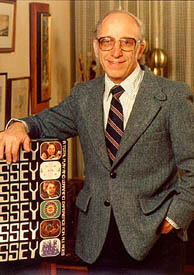
NEW YORK (CNN/Money) – Not many people can list starting a $10 billion industry among their accomplishments. Ralph Baer can.
In 1951, as an engineer making television sets, Baer had the passing thought that adding a gameplay element to TV might be fun. His bosses disagreed. Instead of dismissing the idea, though, Baer buried it in his brain and let it churn. Fifteen years later, sitting at a bus terminal in New York City waiting for a co-worker, he began to scribble down notes about TV games. When he got back home, he typed those up into a four-page paper.
Five days after that came a schematic. A month and a half later, on Oct. 20, 1966, he was playing his first video game – a chase game with two spots on a screen. It wasn't exactly the graphics marvel today's players are used to, but it held enough appeal for Sanders Associates, the military electronics firm that employed Baer, to keep funding its research and development.
Today, at age 81, Baer is as surprised as anyone that the diversion he created has grown as big as it has.
"I was just looking for some thing neat, something entertaining," he told me this week. "[Video games] have vastly exceeded their potential. ... Look at these sports games. It's as close as you can get to being there."
While Baer still keeps abreast of the gaming industry, he concedes his best days as a player are long behind him (though he still enjoys an occasional sports simulation).
 |
|
| Baer and the Odyssey, the first in-home video game machine. |
"I'm nowhere near as knowledgeable about games as my 13 year old grandson," he said. "When you get to be over 80, your coordination goes to hell and a half."
Long before the days of PlayStation and Xbox, there was the Odyssey. In 1972, Sanders Associates (and, by default, Baer) were working with Maganavox to create the first in-home gaming console. The Odyssey sold 100,000 units at $100 each that year. The prototype for that machine, known only as "the brown box", is headed to Washington, D.C. these days to be part of an upcoming inventors exhibit at the Smithsonian Museum.
"I'll be enshrined in the Smithsonian," said Baer. "That's where you like to have your stuff - unless it's stored in a storage room somewhere there."
Despite founding the industry, Baer never got particularly rich off of it. The patents for his inventions expired long ago. And while he spent countless hours in court defending those patents, it was Magnavox (which eventually became Sanders' exclusive licensee) that pocketed the judgments. Still, he said, "I was well taken care of. I have no complaints." (It's worth noting he also has dozens of other inventions to his name, including the hit electronic game Simon.)
While he's proud of what he created – and said there are a lot of good games on the market today - Baer's not happy with every direction the industry has taken, particularly some of today's more popular action games.
"All this violence, who needs it?," he said. "All this gross stuff? Who needs blood all over the floor? But, hey, it sells. I'm just an old fart talking. ... Still, I wish there was a little more content in some of this stuff."
That's not to say he subscribes to the belief that violent video games result in real world violence or train children to be killers.
"The people who say that [are] the same parents who can't control their kids," he said. "I don't see eye to eye with that. It's the parent's fault. There's nothing in the bible that says 'you must play video games'. Just say no to them. Make them do their homework, then they can go outside and play."

| |
|
More columns? Click the orc
|
|
It's not like shooting games are anything new, though. Four months after that 1966 'chase' game emerged, an associate of Baer's (who had joined his team) had created a light-gun, letting players "shoot" the screen. The excitement over that light gun kept the project alive.
While he's not active in the game industry anymore, Baer still has some dreams of where it might go next.
"3D games were tried once - and failed because they weren't properly executed, but now that the processing power's there, who knows?," he said. "3D sounds are already there. ... For all we know - and this might be 10-15 years from now - we might not be sitting in front of a TV, but just pop a pair of glasses on and play the game."

Morris is Director of Content Development for CNN/Money. Click here to send him an email.
|

